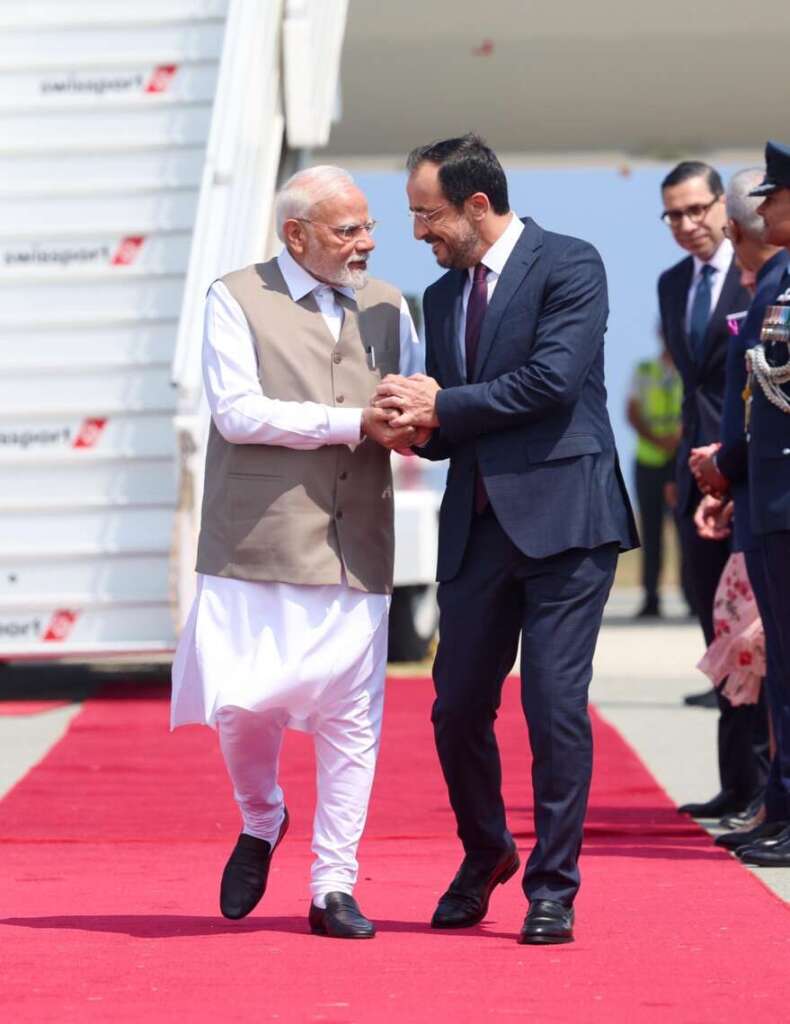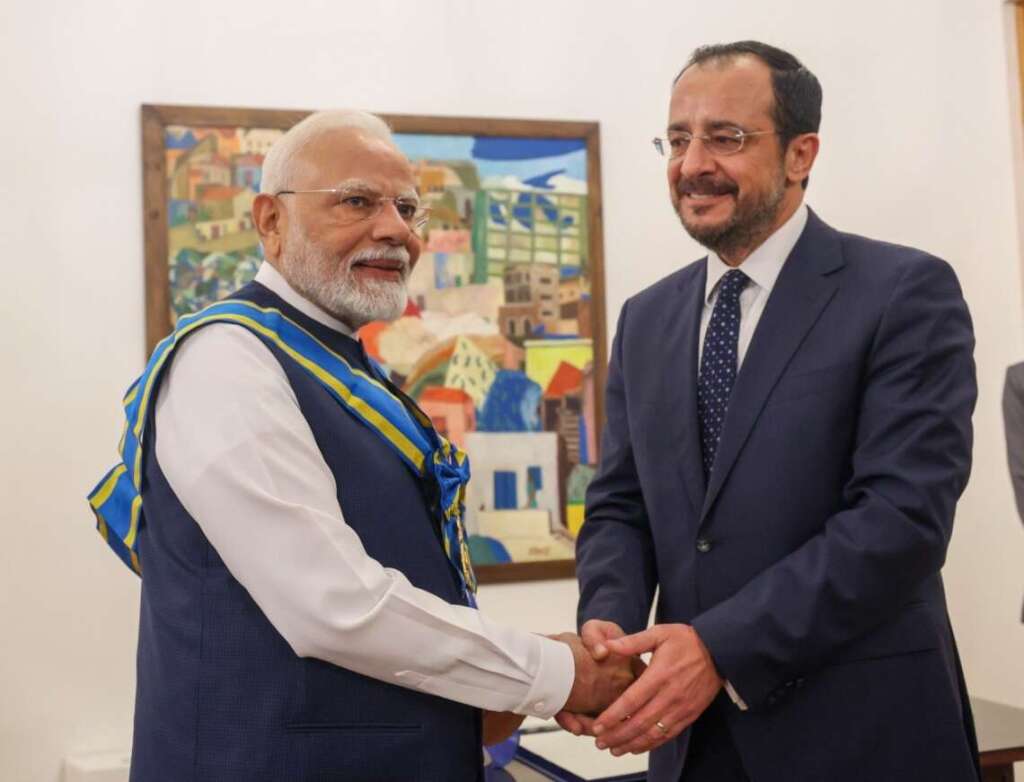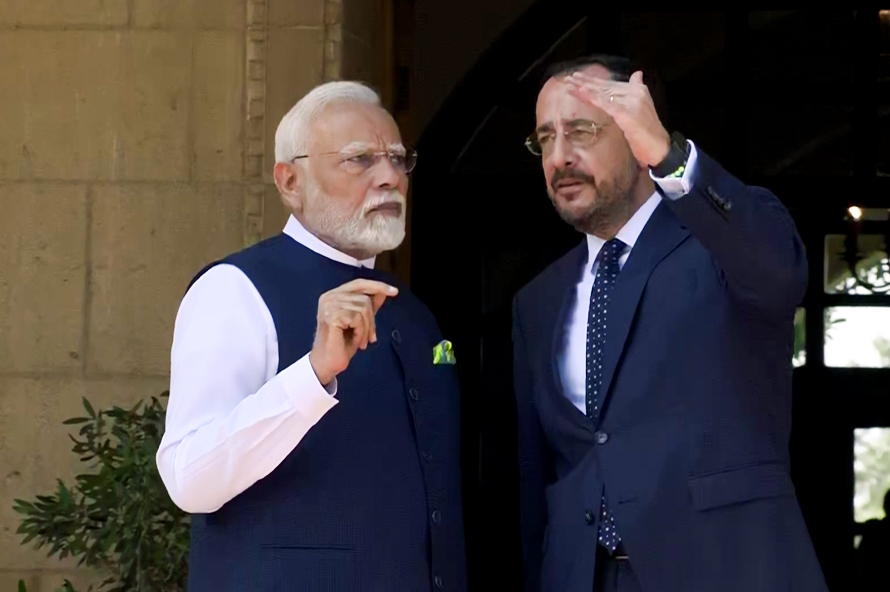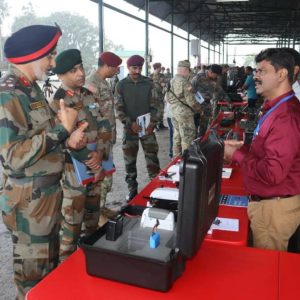Cyprus’s upcoming presidency of the Council of the European Union, scheduled for early 2026, makes this moment even more opportune for India, writes Arnav Raje
Prime Minister Narendra Modi’s recent visit to Cyprus wasn’t just another diplomatic handshake. As the first Indian PM to visit the Mediterranean island in over two decades, and only the third ever, Modi’s timing was no coincidence. His stop in Nicosia began a larger diplomatic tour that included Canada for the G7 and Croatia. But it was Cyprus that he chose to open with, his first time out of Indian soil after fighting with Pakistan – and that says a lot. This was not merely a ceremonial visit where Modi received Cyprus’s highest civilian honour, the Grand Cross of the Order of Makarios III. It was a strategic statement aimed squarely at Türkiye.
The backdrop of this visit is deeply strategic. Erdogan has led his country closer to Pakistan, transforming its ties from fraternal to fiercely supportive. Ankara has publicly backed Islamabad’s stance on Kashmir, ramped up defence cooperation, and extended economic and military aid. During India’s recent Operation Sindoor against cross-border terror networks, Turkey stood firmly behind Pakistan, echoing its rhetoric openly on the global stage.

For New Delhi, this tightening Ankara–Islamabad axis is cause for concern. Enter Cyprus. Cyprus and Turkey have been at odds since 1974, when Turkish forces occupied the northern third of the island, later self-declaring it an independent state known as the Turkish Republic of Northern Cyprus – recognised by no one but Turkey. The occupation has led to decades of tension, with ongoing disputes over sovereignty, drilling rights, and military presence. By visiting Cyprus now, and affirming India’s support for its sovereignty and reunification, Modi isn’t just playing diplomat. He’s sending a calibrated message to Turkey: if you get too cosy with our enemies, we know where to show up. Classic geopolitical deterrent – polished, precise, and polite.
But there’s more to this visit than a strategic stare-down. Cyprus also fits neatly into India’s long game for deeper integration with Europe. A member of the European Union, Cyprus sits at the crossroads of Europe, Asia, and Africa. It’s an ideal launchpad for trade and investment. Modi and Cypriot President Nikos Christodoulides discussed India’s interest in using Cyprus as a logistics and maritime hub under the larger framework of the India–Middle East–Europe Economic Corridor (IMEC). The idea is to connect Indian ports to Europe via the Middle East, and Cyprus, with its strategic location and advanced port infrastructure, could be a key piece in that puzzle. Both leaders agreed to enhance cooperation in sectors like shipping, fintech, digital infrastructure, and clean energy. Cyprus, for its part, is keen to attract Indian FDI and position itself as a base for Indian businesses operating in the EU.

Cyprus’s upcoming presidency of the Council of the European Union, scheduled for early 2026, makes this moment even more opportune for India. With a reliable friend at the helm, India hopes to accelerate negotiations for a long-pending Free Trade Agreement (FTA) with the EU – a deal that has stalled for years over regulatory issues. Cyprus has pledged to support India’s FTA ambitions, following the model of New Delhi’s recently concluded agreement with the UK. The two sides agreed to collaborate on critical issues like counter-terrorism and digital cooperation at the EU level. Perhaps more notably, Cyprus assured India it would raise the matter of terrorism emanating from Pakistan in relevant EU discussions – an assurance that adds a layer of strategic convergence between Nicosia and New Delhi.
Economic diplomacy was another highlight of the visit. Modi and Christodoulides presided over a bilateral business roundtable in Limassol, where key players from both countries discussed joint ventures and investment opportunities. Areas like maritime logistics, IT services, AI, and renewable energy are high on the list. The two countries are also exploring a new Mobility Partnership Agreement to streamline the movement of professionals, students, and skilled labour between the two nations. Talks are underway to establish direct air connectivity between Indian and Cypriot cities to boost tourism and business exchanges. Cyprus, with its English-speaking environment and EU credentials, is an attractive destination for Indian students and entrepreneurs alike. This partnership is a win-win for a nation looking to diversify its global economic footprint.
Modi’s Cyprus stop wasn’t a standalone affair. It was the first act in a broader diplomatic arc that led to renewed engagement with Western allies at the G7 in Canada and a strategic outreach to Croatia.
In foreign policy, optics matter. And in a world of quiet rivalries and sharp alliances, choosing to begin a high-level tour in Cyprus is the kind of move that says a lot without raising a voice. It demonstrated India’s willingness to play a more assertive role in the Eastern Mediterranean – a region increasingly shaped by Turkish influence- to align more closely with EU interests.












